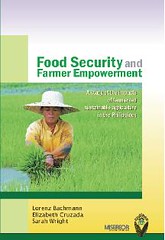Food security and poverty alleviation is possible, thanks to an agricultural system that puts the interests of the small farmers front and center.
This is the positive message of a new book called “Food Security and Farmer Empowerment: A study of the impacts of farmer-led sustainable agriculture in the Philippines” which shows the overwhelming benefits of a sustainable agriculture system led and practiced by small-scale farmers. The book is a summary of the results of an extensive impact evaluation of MASIPAG, a nation-wide network of farmers, scientists and NGOs promoting and implementing sustainable agriculture (SA) for more than 20 years now.
The impact study, considered as one of the largest ever undertaken on organic sustainable agriculture in Asia, incorporated the experiences of 840 full organic, partially organic, and conventional farmers. Key findings of the study include:
• 88% of the organic farmers have better food security compared to 44% of the conventional farmers;
• organic farmers have 2-3.7 times more diverse diet (more vegetables, fruits, meat and protein source) than the conventional farmers;
• organic yields at par with the conventional; conventional farmers having decreased yields overtime while the organic remains steady;
• significantly higher livelihood incomes of the poorest 25% of the organic farmers, 1.5 times than that of the poorest 25% conventional farmers;
• positive annual household cash balance of almost Php5,000 while the conventional farmers are almost always negative; and
• organic farmers are more actively involved in community organizations and have higher rates of training and adoption of sustainable agriculture techniques.
Sustainable agriculture as practiced by MASIPAG also has positive environmental outcomes. Organic farmers have completely stopped using chemical fertilizers and pesticides, yet they have increased soil fertility, stronger crop tolerance to pests and diseases and higher on-farm crops and livestock diversity. These practices, fortified with an active rice breeding program and strong social mechanisms make sustainable agriculture an effective coping mechanism against climate change.
The book stresses that “there are solutions to the problems of the world today, and they are already being practiced by tens of thousands of people in the Philippines.”
“MASIPAG’s farmer-led sustainable agriculture approach is a clear cause of hope, not only for small-scale farmers seeking solutions, but to all who care about our world.”
About MASIPAG
MASIPAG is a Filipino farmers-scientists network practicing sustainable agriculture, genetic conservation and sharing of farmer knowledge for more than twenty years. Created during the height of food insecurity and debt trap of the green revolution, the network has grown and reached tens of thousands of farmers involved in the revival and improvement of indigenous
rice varieties that would not require imported inputs and generate appropriate technologies attuned to farmer’s problems and needs.
About the authors
Dr Lorenz Bachmann is a freelance consultant from Germany specializing in agriculture and rural development. With a focus on impact-oriented monitoring and evaluation and organic farming, he has over 20 years of experience working in Asia and Africa for NGOs, governments and international organizations.
Ms Elizabeth Cruzada has worked with women’s and rural development organizations in the Philippines for 24 years. She served as the National Coordinator of MASIPAG from 2003 to 2007, where she is still presently involved as its coordinator for organizational development.
Dr Sarah Wright is a lecturer in geography and development studies at the University of Newcastle in Australia where she specializes in food security and food sovereignty, post-colonialism and critical development.
Her approach is action-based and she works closely with farmers, indigenous peoples and community groups in the Philippines, Cuba and the United States.
Electronic copies are available for download at www.masipag.org. Hard copies of the book are also available. Kindly email MASIPAG at info[at]masipag[dot]org for more information.




Comments are closed